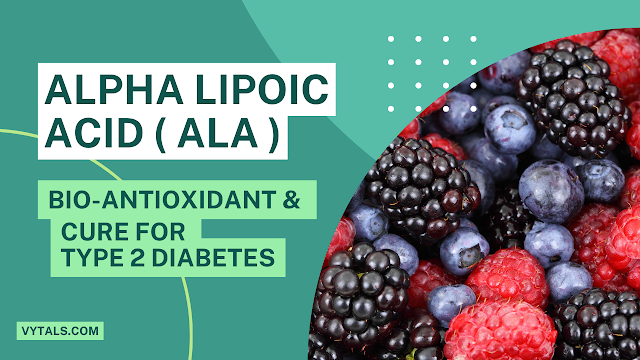Alpha-Lipoic Acid ( ALA ) Bio-Antioxidant | Benefits & Side Effects
By: Dr. Sonam Bhatia, MS (Pharma), PhD
Alpha-Lipoic
Acid is produced in the human body as a naturally occurring compound and it
plays a vital role in the production of energy at a cellular level. In good
health, the body can produce all the ALA necessary for these functions.
Despite
this, ALA supplements have recently gained a great deal of interest. A wide
range of benefits has been associated with ALA, ranging from treatment of
conditions such as diabetes and HIV to weight loss enhancement.
The effects of ALA supplementation have been sparsely studied. Still, however, some benefits may have been identified. Below are a few possible health benefits of consuming Alpha-Lipoic Acid supplements:
ALA,
the powerful biological Antioxidant
ALA
is regarded as a powerful biological antioxidant that protects the body's
cells from damage caused by free radicals.
The
level of free ALA in the body does not appear to be influenced by ALA derived
from food such as yeast, liver and heart, spinach, broccoli, and potatoes.
The
purpose of taking ALA supplements is to improve a variety of health conditions.
This is based on sufficient scientific evidence that proves supplemental ALA is
beneficial for health.
It
has been found that about 30% to 40% of an ALA supplement's oral dose is
absorbed by the body. Additionally, it is suspected that ALA may be better
absorbed when taken on an empty stomach.
ALA
and Diabetes
ALA
may benefit individuals with Type 2 Diabetes in at least two different ways, although
studies are still sparse. Some studies suggest that in people with type 2
diabetes, ALA supplements may enhance the body's ability to use its insulin to
lower blood sugar levels. Diabetes can lead to peripheral neuropathy, a symptom
caused by nerve damage that ALA may prevent.
ALA
has been used in Europe for decades to relieve pain, burning, tingling, and
numbness associated with diabetic neuropathy. Several comprehensive studies
have found that large intravenous doses of ALA relieve such symptoms. More
research is required to establish the effectiveness of oral ALA supplements for
diabetic neuropathy.
ALA
and Other Health Conditions
ALA
may be used to prevent or slow the damage caused by a variety of other health
conditions, from HIV to liver disease. Many of the findings are still early in
the research process because the evidence is not conclusive.
Additionally,
supplemental ALA has recently gained attention as a weight loss supplement.
Side
Effects and Precautions of ALA Supplements
ALA
supplements cause only mild side effects, like skin rashes. However, little is
known about the possible long-term effects of ALA supplementation.
Additionally, there are no dosage recommendations and little data on the
potential impact of large doses taken over time.
ALA
should not be consumed without a doctor's recommendation if you take insulin or
other medication that lowers blood sugar, as it may enhance the effects of
these drugs, resulting in hypoglycemia (low blood sugar). It is advised to consult
your physician before taking supplemental ALA in such a case as your physician
may advise monitoring your blood sugar levels more frequently. It could also
lead to an adjustment in your medication.
There
have been no studies conducted on the effects of consuming ALA during
pregnancy, therefore it is advised not to do so if you are pregnant.
Furthermore, children should not take ALA supplements due to a lack of data
regarding their use.
Synergistic
role of Alpha-Lipoic Acid (ALA) and Vitamin E
Vitamin
E and Alpha-Lipoic Acid exhibit synergistic effects, as demonstrated in models
of oxidative damage. Thus, ALA-VE has the potential to prevent lesion
enlargement and treat pathological conditions where oxidation is a major source
of damage, such as diabetic neuropathy, heart and brain ischemia, and
Alzheimer's disease.
Findings
from brain ischemia, diabetes, or aging experimental models suggest that the
ALA-VE combination may be beneficial for ameliorating oxidative damage or
improving cardiac performance after infarction, in models where the ALA-VE
combination is tested. Therefore, it is recommended to take ALA combined with
Vitamin E to improve its overall activity.
Summary:
ALA
is a powerful antioxidant that protects the body's cells from damage caused by
free radicals. The purpose of taking ALA supplements is to improve a variety of
health conditions. About 30% to 40% of an ALA supplement's oral dose is
absorbed and may be better absorbed if taken on an empty stomach. Combine it
with Vitamin E to enhance its effectiveness.
Sources:
Alpha-lipoic
acid as a biological antioxidant - ScienceDirect
Frontiers
| Diabetes and Alpha Lipoic Acid | Pharmacology (frontiersin.org)
Effects
of Alpha-Lipoic Acid on Body Weight in Obese Subjects - ScienceDirect





.png)

Comments
Post a Comment